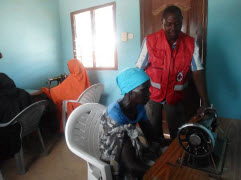
‘’I remember that dark day vividly in my mind just like it was yesterday. When the war broke out in the oil city of Malakal, in South Sudan, my [Nuer] community was targeted to be killed’’, says Angela Nyakuok Riek. Angela is 60 years old and left South Sudan in 2006 to become a refugee in Kenya. She is among the 449 South Sudanese refugees who live in one of Kenya’s five Dadaab refugee camps on the Somali border and for years she was overlooked by humanitarian agencies that seek young energetic English-speaking youth to employ in the camps. Elderly widows, like Angela, face ongoing challenges, such as poor access to scarce resources, shelter and employment.
In South Sudan, before she got married, Angela’s family survived on crop farming, animal husbandry, and selling firewood. In Dadaab, Angela supports eight children, some belonging to her dead relatives and she had no source of income. Angela has relied on food ratios from the World Food Programme (which were reduced in recent months), and sells some of this food to buy some essentials household items: “I am the mother and father to these children. The mother to one of my nieces who is under my care was killed in the Darfur conflict”.
Today, however, Angela holds more hope for her family’s future. She is one of 20 refugees (16 women and four men) selected to participate in a six-month tailoring training course offered by the Kenya Red Cross (KRCS) through a violence prevention project funded by the Canadian Red Cross and the Irish Red Cross. When asked about the importance of the tailoring course she says, “I will now be able to sew clothes for my children and for commercial purposes; [and] as an elderly woman I can advise the young people to engage in businesses as it is better than [being a labourer].”
At the end of the training in June 2014, the 20 trainees will be given sewing machines to start a tailoring shop. It is hoped the livelihood activities will empower women, and lead to a reduction in inter-community and domestic violence: ‘’I am very happy with the livelihood activity introduced by the KRCS violence prevention project […] this tailoring training will make us self-reliant [and] thus stop being dependant on outsiders.”